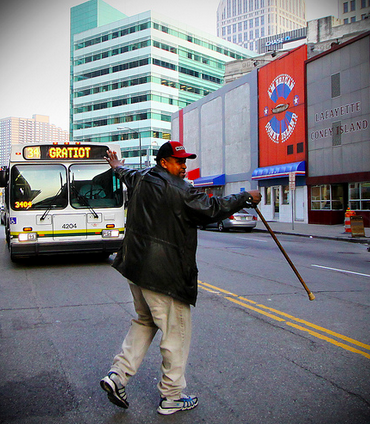A new labor contract between the Detroit Department of Transportation and ATU Local 26 explicitly ties bus driver bonuses to ridership increases.

If farebox revenue goes up, 30 percent of the increase will belong to drivers, up to a certain point, DDOT announced earlier this week. Individual drivers' bonuses are capped at $350 per year the first year and can rise to $750 in the fourth year of the contract.
The bus drivers union ratified the agreement on Friday. “With fare box sharing, if DDOT succeeds, our drivers will share financially in that success," Fred Westbrook, president of ATU Local 26, said in the press release.
Megan Owens of Detroit's Transportation Riders United said she's generally supportive of the revenue-sharing provision.
"If they have a little extra reason to help out a new rider to have a good experience or be a little more patient with a frustrating rider ... that appears to be a worthwhile investment," she said.
Steven Higashide of TransitCenter said revenue-sharing is a "really innovative and fascinating provision" that he hasn't seen elsewhere.
Transit riders and bus drivers often team up to oppose service cuts, Higashide said, but in other instances, their interests can be at odds. For example, a union may hesitate to support the kind of bus network redesign that Houston just took on.
"I think in some cases the default position of a union is to be neutral or even slightly negative on a change in service," said Higashide. "Any change has the potential to make their work more difficult."
This contract, however, "creates an automatic incentive for labor to support a redesign that would improve ridership," he said.
Detroit's transit system has been a constant disappointment to riders. But a tax increase on the ballot next year could expand service and help resolve some of the dysfunction plaguing the system. If the tax is approved, expanded service would be handled by RTA, which will operate separately from DDOT, Owens said.
Update: A spokesperson for the Amalgamated Transit Union International says that this kind of contract is rare but not unprecedented. He added that drivers won't likely benefit much unless the city invests in new buses and routes.





